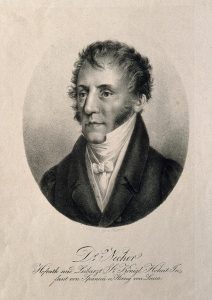
Georg Friedrich von Necher
Georg Friedrich von Necher (sometimes misspelled Neckar/Necker) MD (ca. 1770 – ca. 1848) was family physician to the Intendant General and commander of the Austrian army in Italy, Baron Franz von Köller and, later, Royal Court Physician to the Duke of Lucca.
Necher’s patient, Köller, was described as an “enlightened protector of homeopathic medicine,” and is credited with the introduction of homeopathy to Italy in 1821 when he brought with him a copy of Hahnemann’s Organon that was translated into Italian.
The real introduction of homeopathy into Italy, however, was due to Necher who established a thriving homeopathic practice in Naples. This would be the catalyst for the spread of homeopathy on the Italian peninsular.
Little is known of Necher’s early life but according to the great French historian of homeopathy, Pierre Augustus Rapou, Necher came from Melnik, a town in Bohemia, near Prague, in the Austrian Empire.
Dr. Necher, who had been cured by Hahnemann himself of a dangerous disease of the lungs, studied the principles of the science which had saved his life….
Necher had studied with Hahnemann in Leipzig and possibly due to the contacts he made there had became personal physician to Austrian general and devoted Hahnemannian, Baron Franz von Köller.
In June 1822 Necher joined Köller in Naples, and it was there that homeopathy in Italy began. This led Rapou to later comment that “Naples, in relation to homeopathy, is to Italy what Leipzig is to Germany.”
Necher himself provided some insight into how he came to homoeopathy, and how he had successfully introduced it to Naples in a letter dated 10th March, 1826, to Dr. Moritz Wilhelm Müller in Leipzig:
“The unforgettable founder of the homeopathic healing method, Dr. S. Hahnemann, who diagnosed in me a pulmonary suppuration, deserves the thanks of those whose lives I have saved through my efforts and my little knowledge of this salvation …. In the 4 years of my stay here it has been my duty to introduce homeopathy into the medical community here. After doing my doctorate at the Neapolitan University, I set up a homeopathic clinic for chronic patients in my building, without saying that my treatment was homeopathic. Neapolitan and Austrian physicians visited this clinic, and the number of patients treated at the same time rose to 40-50 individuals. The happy successes of this method of treatment have won homeopathy a significant number of firm and zealous friends.
In addition to his private practice, in May, 1823, Necher had indeed opened a homeopathic dispensary for the poor in his own house in Naples. This clinic quickly proved a great success, not only for treating patients but also in training numerous doctors in the practice of homeopathy. It was not long before orthodox Neapolitan physicians Francesco Romani, Giuseppe Mauro and Cosmo Maria De Horatiis became converts, helping to make homeopathy known in the region and in Italy as a whole.
The dispensary was closed the following year, Necher having been sent to Rome by Maria Isabella of Spain, Queen of Naples, to take professional charge of her sister, Maria Luisa, then Queen of Etruria and mother of Charles II, Duke of Parma (later Duke of Lucca). However, in March 1824 the Queen died, and Necher returned to Naples where he remained until Baron von Köller’s own death in 1826.
In September of that year Necher was appointed physician to Charles II Duke of Parma (then Duke of Lucca) and his court, a position which he held until 1848.
In August 1829 a large crowd of Hahnemann’s disciples and devotees descended on Köthen to celebrate the 50th anniversary of his doctoral award from the University of Erlangen. Necher’s name appears in the list of the contributors to this Hahnemann Jubilee of 1829 as ”Hofrath Necher, Leibarzt S R H des Herzogs von Lucca, zu Lucca Italien.”. His name is on both the Zeitung and Frederick Hervey Foster Quin lists.
Throughout this period Necher continued in private practice, prescribing a homeopathic remedy for gout for the archaeologist Sir William Gell who had a home in Naples.
In early March 1833, while in Berlin with the Duke of Lucca, Necher was called to attend the noted German writer and salon hostess, Rahel Varnhagen. Although her condition was terminal, in an effort to alleviate her suffering Necher had been recommended by Rahel’s friend and fellow writer, Bettina von Armin, herself a dedicated advocate of homeopathy. Necher postponed his departure from the city to treat Rahel, calling on her once or twice every day, but ultimately to no avail.
In addition to converting the Neapolitan doctors Francesco Romani, Giuseppe Mauro and Cosmo Maria De Horatiis to homeopathy, Necher is also believed to have been responsible for introducing English physician Frederick Hervey Foster Quin to Hahnemann’s system. As such Georg von Necher can be considered as the direct inspiration for the establishing of homeopathy in Britain.



Leave A Comment